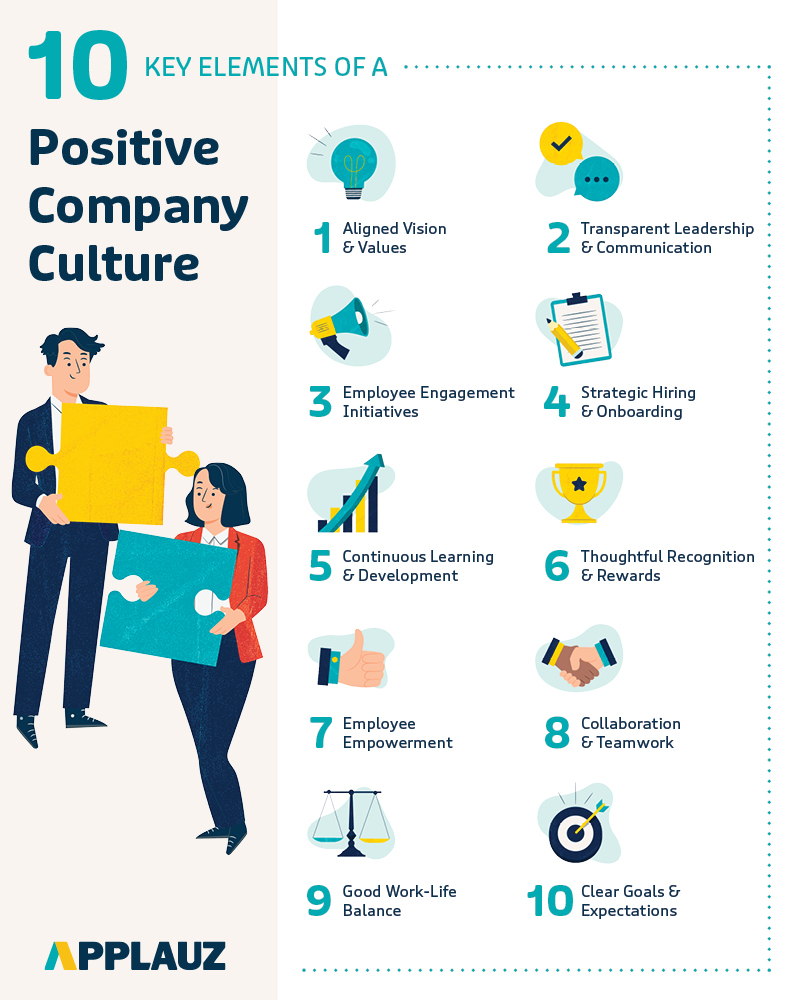In today's competitive business world, creating a strong company culture is crucial for organizational success. A clear and nurtured company culture can help attract and keep talented employees, boost their satisfaction and productivity, and ultimately contribute to the overall growth and success of the company.
Let's explore the key components of a strong company culture and delve into best practices that can help businesses create and maintain a positive and thriving work environment.
 1. Vision and Values
1. Vision and Values
A strong company culture starts with a clear and compelling vision, coupled with a set of core values that guide the actions and behaviors of employees. The vision represents the long-term goals and aspirations of the company, while the values define the principles and beliefs that shape the company's culture. By effectively communicating the vision and values to employees, organizations can align everyone towards a common purpose and foster a sense of unity and direction.
 2. Leadership and Communication
2. Leadership and Communication
Leadership plays a crucial role in shaping and maintaining a strong company culture. Leaders should lead by example, demonstrating the values and behaviors they expect from their employees. Open and transparent communication is key to building trust and fostering a positive work environment. Regularly sharing company updates, seeking feedback, and encouraging two-way communication can empower employees and make them feel valued and involved.
 3. Employee Engagement
3. Employee Engagement
Engaged employees are more likely to be productive, innovative, and committed to their organization. Companies can foster employee engagement by creating opportunities for professional growth, providing regular feedback and recognition, and encouraging a healthy work-life balance. Employee engagement initiatives, such as team-building activities, mentorship programs, and wellness initiatives, can help cultivate a sense of belonging and ownership among employees.
 4. Hiring and Onboarding
4. Hiring and Onboarding
Recruiting individuals who align with the company's values and culture is essential to building a strong organizational culture. During the hiring process, companies should focus not only on assessing candidates' skills and qualifications but also on evaluating their cultural fit. Once hired, a comprehensive onboarding process should be in place to introduce new employees to the company's culture, values, and expectations. This helps new hires quickly acclimate to their roles and integrate into the existing work environment.
 5. Continuous Learning and Development
5. Continuous Learning and Development
Investing in employee learning and development is a fundamental aspect of a positive company culture. Providing opportunities for employees to enhance their skills, acquire new knowledge, and grow professionally not only benefits the individual but also contributes to the overall success of the organization. Companies can offer training programs, workshops, mentorship opportunities, and educational resources to support employees' ongoing development and encourage a culture of continuous learning.
 6. Recognition and Rewards
6. Recognition and Rewards
Recognizing and rewarding employees' contributions and achievements is vital for creating a positive and motivating work environment. Celebrating milestones, acknowledging exceptional performance, and providing meaningful rewards can boost employee morale, increase job satisfaction, and foster a culture of appreciation. Companies can implement recognition programs, such as employee of the month, peer recognition, or performance-based incentives, to reinforce desired behaviors and motivate employees to excel.
 7. Employee Empowerment
7. Employee Empowerment
Empowering employees to make decisions and take ownership of their work is crucial for building a thriving company culture. When employees feel trusted and valued, they are more likely to be engaged and motivated.
 8. Collaboration and Teamwork
8. Collaboration and Teamwork
Promoting a collaborative and inclusive work environment is crucial for building a healthy company culture. Encourage teamwork and open communication across departments and levels of hierarchy. Foster a sense of camaraderie and create opportunities for employees to collaborate on projects, share knowledge, and learn from one another.
 9. Work-Life Balance
9. Work-Life Balance
Recognize the importance of work-life balance and support your employees' well-being. Encourage flexible work arrangements, provide resources for stress management, and promote a healthy work environment. When employees feel supported and valued, they are more likely to be satisfied, engaged, and productive.
 10. Clear Goals and Expectations
10. Clear Goals and Expectations
Set clear goals and performance expectations for your employees. Align these objectives with your company's mission and values, and ensure that they are communicated effectively. Regularly provide feedback and guidance to help employees track their progress and make necessary adjustments.



